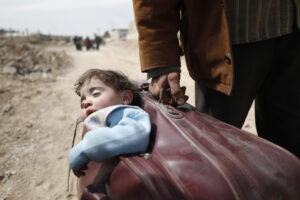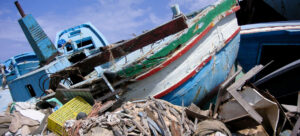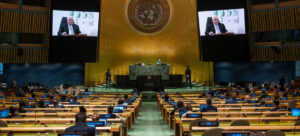Terrorism, violent extremism and instability were a constant threat in the region, and now, “a note of anguish and tragedy has been added by the arrival of the COVID-19 pandemic.”
The Prime Minister was speaking on the 5th day of the high-level week of the General Assembly. After being held virtually last year due the coronavirus pandemic, this year’s gathering features “hybrid” activities that include leaders in person along with virtual participants.
The threat of terrorism
Mr. Maïga, who has led the transitional government since 11 June, said that the Malian people place “all their hopes in the process of political transition underway.”
Since March 2012, when coup d’état happened in the country, he said, the situation “has hardly improved, despite international support and the presence of a UN peace operation, MINUSMA, and other international forces.”
“The situation has continued to deteriorate steadily, to the point that entire sections of the national territory are beyond the control of the Government. My fellow citizens live under the grip of terrorist and armed groups and with their most basic rights denied. Their access to basic services remains hypothetical due to the weak presence of the State.”
Paying tribute to “all women and men who work under the banner of MINUSMA, officially known as the UN Multidimensional Integrated Stabilization Mission in Mali, in difficult conditions, often perilous”, he argued that the Mission should continue to evolve.
“We must have the courage and lucidity to question the instruments and mechanisms mentioned above. We should also and above all put back on the table the demand for a more robust mandate and a change in the posture of the MINUSMA,” he said.
Changes to MINUSMA
Mr. Maïga said that since MINUSMA was created, in 2013, the terrorist threat “has deteriorated continuously.”
He then pointed to the departure of the French Forces that are part of the Operation Barkhane.
“The unilateral announcement of Barkhane’s withdrawal and its transformation ignored the connection that binds us, the UN, Mali and France, on the front lines of the fight against the factors of destabilization,” he said.
He added that this “new situation” lead his Government “to explore ways and means to better ensure security, independently or with other partners, so as to fill the void that will inevitably be created.”
For him, the situation “should also prompt the United Nations to now have a more offensive posture on the field.”
“The United Nations must help Mali to fight more effectively against the transnational organized crime in order to establish the real conditions for its stabilization, guarantee of the success of political, humanitarian, development and protection of human rights.”
Elections
According to the Prime Minister, another priority for his Government is the organization of the elections.
He argued that, to mark the return to constitutional order to the country, the scrutiny has to be “transparent, credible and inclusive”.
“These elections are particularly important because they will be the barometer of the success of the Transition. We know that their quality and credibility will condition the future of our democracy, the legitimacy and solidity of our institutions,” he concluded.
Read the full statement in French.











